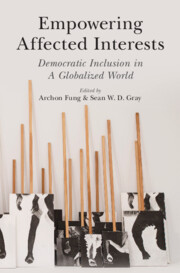Acknowledgments
This volume has its origins in a series of informal conversations that began between the coeditors at the Harvard Kennedy School in early 2016. There was a feeling at the time that democratic theory had come to an impasse in trying to account for new demands for democratization that outstripped the capacities of the nation-state to deliver, including in immigration, climate governance, and international trade and finance, and in domains ranging from the domestic workplace to the World Bank. The idea for a workshop was floated, and we soon assembled a stellar team of workshop organizers who met over the next few months: Danielle Allen, Archon Fung, Sean Gray, and Tomer Perry.
Given the ambitious scope of this project, we knew from the get-go that we needed the input and perspectives of a diverse team of leading scholars. We also knew that the format of our meetings had to be somewhat unconventional if we were going to genuinely break new ground. The strategy that we hit upon was to organize two in-person workshops – held approximately six months apart – so that our invited participants could submit shorter “think pieces” and receive feedback, before committing to a more substantial chapter-length contribution. In between these in-person meetings, we organized two online brainstorming sessions, with participants gathering in small thematic working groups. This had the bonus of ensuring the conversations and debates that emerged over the course of the workshops were captured in the papers that were eventually submitted, as our participants tested their ideas and arguments and learned from one another.
The first in-person workshop was held over two days at Harvard University in December 2016, and the second in-person workshop took place over two days in June 2017. We invited sixteen participants to develop papers: Joseph Carens, Thomas Christiano, Robert Goodin, Carol Gould, Sean Gray, Clarissa Hayward, Hélène Landemore, Melissa Lane, Terry Macdonald, Tomer Perry, Rob Reich, Jennifer Rubenstein, Emma Saunders-Hastings, Anna Stilz, Laura Valentini, and Mark Warren. Each paper was paired with an expert commentator who was tasked with providing constructive feedback on the same paper over successive drafts. For their willingness to serve as commentators, and their critical feedback throughout the process, we wish to thank Arash Abizadeh, Danielle Allen, Arthur Applbaum, Eric Beerbohm, Gerald Frug, Archon Fung, Mathias Koenig-Archibugi, Jane Mansbridge, Christopher Robichaud, Nancy Rosenblum, Lucas Stanczyk, Dennis Thompson, Melissa Williams, and Annette Zimmerman.
In addition to the Harvard workshops, a set of panels was organized for the 2017 American Political Science Association Annual Meeting in San Francisco to publicly showcase our works-in-progress. We are indebted to the presenters and audiences who participated in this event. We also gratefully acknowledge the financial and logistical support provided by the Harvard Kennedy School’s Roy and Lila Ash Center for Democratic Governance and Innovation, and the Edmond and Lily Safra Center for Ethics, Harvard University. The project would not have gotten off the ground were it not for the advice and dedication of several Ash and Safra Center staff, including Tim Glynn-Burke, Hannah Hilligoss, Nadia Chavez, Jose Martinez, Jess Miner, Maggie Gates, and Susan Cox.
Robert Dreesen, editor at Cambridge University Press, was enthusiastic about the project from the moment we approached him. We would like to thank Robert and the rest of the Cambridge University Press team – especially, Sable Gravesandy, Becky Jackaman, and Balaji Devadoss – for their suggestions and guidance throughout the publication process. Moira Eagling completed the final copyediting of the manuscript with great care, and Victoria George prepared the index with diligence and speed.
Our work on the volume was delayed by the COVID-19 pandemic, which continues to impact millions around the globe at time of writing. Many people were sick, lost their lives, or know people who were sick and lost their lives. Governments closed economies and suspended travel. There was a scientific arms race to produce test kits and distribute vaccines to halt the spread of the virus. Countries and jurisdictions openly competed with one another for scarce resources to prop up their overburdened health and welfare systems. And, as is almost always the case, it is the most vulnerable who are most affected. Though the chapters in this volume were written before the pandemic, the need to rethink the boundaries of democratic inclusion in domestic and global policymaking couldn’t be more urgent.
Finally, the coeditors would like to dedicate this volume to the memory of James Bohman, whose extraordinary contributions to deliberative democracy and global political theory paved the way for rethinking the possibilities for democracy across borders. Jim would have been a contributor to this volume, and we continue to feel the loss of his friendship, wisdom, and kindness.

